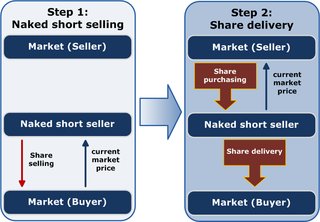Related Research Articles
A market trend is a perceived tendency of the financial markets to move in a particular direction over time. Analysts classify these trends as secular for long time-frames, primary for medium time-frames, and secondary for short time-frames. Traders attempt to identify market trends using technical analysis, a framework which characterizes market trends as predictable price tendencies within the market when price reaches support and resistance levels, varying over time.
Investment is traditionally defined as the "commitment of resources to achieve later benefits". If an investment involves money, then it can be defined as a "commitment of money to receive more money later". From a broader viewpoint, an investment can be defined as "to tailor the pattern of expenditure and receipt of resources to optimise the desirable patterns of these flows". When expenditures and receipts are defined in terms of money, then the net monetary receipt in a time period is termed cash flow, while money received in a series of several time periods is termed cash flow stream.

Day trading is a form of speculation in securities in which a trader buys and sells a financial instrument within the same trading day, so that all positions are closed before the market closes for the trading day to avoid unmanageable risks and negative price gaps between one day's close and the next day's price at the open. Traders who trade in this capacity are generally classified as speculators. Day trading contrasts with the long-term trades underlying buy-and-hold and value investing strategies. Day trading may require fast trade execution, sometimes as fast as milli-seconds in scalping, therefore direct-access day trading software is often needed.
An exchange-traded fund (ETF) is a type of investment fund that is also an exchange-traded product, i.e., it is traded on stock exchanges. ETFs own financial assets such as stocks, bonds, currencies, debts, futures contracts, and/or commodities such as gold bars. The list of assets that each ETF owns, as well as their weightings, is posted on the website of the issuer daily, or quarterly in the case of active non-transparent ETFs. Many ETFs provide some level of diversification compared to owning an individual stock.

In finance, a dead cat bounce is a small, brief recovery in the price of a declining stock. Derived from the idea that "even a dead cat will bounce if it falls from a great height", the phrase is also popularly applied to any case where a subject experiences a brief resurgence during or following a severe decline. This may also be known as a "sucker rally".

The Bear Stearns Companies, Inc. was an American investment bank, securities trading, and brokerage firm that failed in 2008 as part of the global financial crisis and recession. After its closure it was subsequently sold to JPMorgan Chase. The company's main business areas before its failure were capital markets, investment banking, wealth management, and global clearing services, and it was heavily involved in the subprime mortgage crisis.

James Joseph Cramer is an American television personality, author, entertainer, and former hedge fund manager. He is the host of Mad Money on CNBC, and an anchor on Squawk on the Street. After graduating from Harvard College and Harvard Law School, he worked for Goldman Sachs and then became a hedge fund manager, founder, and senior partner of Cramer Berkowitz. He co-founded TheStreet, which he wrote for from 1996 to 2021. Cramer hosted Kudlow & Cramer from 2002 to 2005. Mad Money with Jim Cramer first aired on CNBC in 2005. Cramer has written several books, including Confessions of a Street Addict (2002), Jim Cramer's Real Money: Sane Investing in an Insane World (2005), Jim Cramer's Mad Money: Watch TV, Get Rich (2006), and Jim Cramer's Get Rich Carefully (2013).

Mad Money is an American finance television program hosted by Jim Cramer that began airing on CNBC on March 14, 2005. Its main focus is investment and speculation, particularly in public company stocks.
Robert V. Pisani is a correspondent for CNBC.
Buy and hold, also called position trading, is an investment strategy whereby an investor buys financial assets or non-financial assets such as real estate, to hold them long term, with the goal of realizing price appreciation, despite volatility.
In finance, an investment strategy is a set of rules, behaviors or procedures, designed to guide an investor's selection of an investment portfolio. Individuals have different profit objectives, and their individual skills make different tactics and strategies appropriate. Some choices involve a tradeoff between risk and return. Most investors fall somewhere in between, accepting some risk for the expectation of higher returns. Investors frequently pick investments to hedge themselves against inflation. During periods of high inflation investments such as shares tend to perform less well in real terms.

Securities fraud, also known as stock fraud and investment fraud, is a deceptive practice in the stock or commodities markets that induces investors to make purchase or sale decisions on the basis of false information. The setups are generally made to result in monetary gain for the deceivers, and generally result in unfair monetary losses for the investors. They are generally violating securities laws.
William H. Miller III is an American investor, fund manager, and philanthropist. He served as the chairman and chief investment officer of Legg Mason Capital Management as well as the principal portfolio manager of the Legg Mason Capital Management Value Trust. He is the portfolio manager of the former Legg Mason Opportunity Trust mutual funds, now housed at his own firm Miller Value Partners.

Naked short selling, or naked shorting, is the practice of short-selling a tradable asset of any kind without first borrowing the asset from someone else or ensuring that it can be borrowed. When the seller does not obtain the asset and deliver it to the buyer within the required time frame, the result is known as a "failure to deliver" (FTD). The transaction generally remains open until the asset is acquired and delivered by the seller, or the seller's broker settles the trade on their behalf.

In economics and finance, market manipulation is a type of market abuse where there is a deliberate attempt to interfere with the free and fair operation of the market; the most blatant of cases involve creating false or misleading appearances with respect to the price of, or market for, a product, security or commodity.
A bear raid is a type of stock market strategy, where a trader attempts to force down the price of a stock to cover a short position. The name is derived from the common use of bear or bearish in the language of market sentiment to reflect the idea that investors expect downward price movement.
Seeking Alpha is a crowd-sourced content service that publishes news on financial markets. It is accessible via a website and mobile app. After a free trial period, users must pay a subscription fee to access content. Independent contributors, mostly from the buy side, write almost all of the articles published by the service and are paid based on how many subscribers access their articles. Notable contributors include Henry Blodget and Paco Ahlgren.

On March 12, 2009, television personality Jim Cramer appeared as a guest on The Daily Show with Jon Stewart. The host of CNBC's Mad Money, Cramer appeared in response to host Jon Stewart's highly publicized week-long criticism of CNBC. The exchange began with a scathing piece on CNBC's miscalculations regarding the financial crisis of 2007–2008 in response to CNBC commentator Rick Santelli, who had recently said on the floor of the Chicago Board of Trade that homeowners facing foreclosure were "losers". Santelli had been set to appear on the show, but CNBC canceled Santelli's appearance. Stewart, along with Daily Show executives, claimed the CNBC montage was not retaliatory and that they planned to show it before the cancellation was announced.

In finance, a bull is a speculator in a stock market who buys a holding in a stock in the expectation that, in the very short-term, it will rise in value, whereupon they will sell the stock to make a quick profit on the transaction. Strictly speaking, the term applies to speculators who borrow money to fund such a purchase, and are thus under great pressure to complete the transaction before the loan is repayable or the seller of the stock demands payment on settlement day for delivery of the bargain. If the value of the stock falls contrary to their expectation, a bull suffers a loss, frequently very large if they are trading on margin. A bull has a great incentive to "talk-up" the value of their stock or to manipulate the market of their stock, for example by spreading false rumors, to procure a buyer or to cause a temporary price increase which will provide them with the selling opportunity and profit they require.

Economic turmoil associated with the COVID-19 pandemic has had wide-ranging and severe impacts upon financial markets, including stock, bond, and commodity markets. Major events included a described Russia–Saudi Arabia oil price war, which after failing to reach an OPEC+ agreement resulted in a collapse of crude oil prices and a stock market crash in March 2020. The effects upon markets are part of the COVID-19 recession and are among the many economic impacts of the pandemic.
References
- ↑ Investopedia entry of "short and distort", Investopedia
- ↑ Glasner, Joanna (3 June 2002). "New Market Trend: Short, Distort". Wired. Condé Nast Digital. Archived from the original on May 10, 2009. Retrieved February 11, 2010.
- ↑ Levine, Timothy R. (2014). Encyclopedia of Deception. SAGE Publications. p. 541. ISBN 9781483306896 . Retrieved August 6, 2015.
- ↑ Connecticut State Attorney General Richard Blumenthal, cited in Wall Street Disses Regs - Liz Moyer, Forbes.com 25 September 2006
- ↑ ‘Market Cop’ Cox Urges Restraint - Directorship Boardroom Intelligence, 18 July 2008
- ↑ ‘Short and Distort’ Conduct Scrutinized - Directorship Boardroom Intelligence, 2 April 2008
- ↑ "A New Wave of Vilifying Short Sellers" New York Times 30 April 2008
- ↑ In a 22 July 2001 hearing of a Senate subcommittee, questions were raised about a "maze of financial transactions that . . . makes Rube Goldberg look like a slacker" to which Chase was one of several banks was a party. Rumors flowed about Chase starting the day after the hearing; on 23 July 2001, Chase's stock prices dropped to a six year low (James Surowiecki, "Short and Distort" The New Yorker 12 August 2002)
- ↑ Thomas Kostigen, MarketWatch.com (March 23, 2007). "Jim Cramer's big mouth: His revelations only confirm what dupes average investors are".
- ↑ Matt Krantz, USA Today (March 24, 2007). "CNBC's Cramer boasts of manipulating markets". USA Today .
- ↑ Roddy Boyd, The New York Post (March 21, 2007). "Cramer's Big Mouth: Clip Could Run Afoul of CNBC".